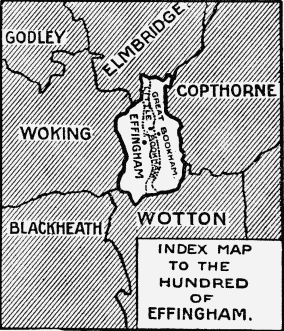Pages 320-321
A History of the County of Surrey: Volume 3. Originally published by Victoria County History, London, 1911.
This free content was digitised by double rekeying. All rights reserved.
THE HUNDRED OF EFFINGHAM
CONTAINING THE PARISHES OF
The Hundred of Effingham is usually classed with Copthorne and described as a half-hundred: i.e. perhaps 50 hides, for in the time of Edward the Confessor the total assessment worked out at 47 hides. In 1086, in addition to the three parishes of Effingham, Great Bookham, and Little Bookham, which compose it at the present day, it included the two unidentified places of 'Driteham' and 'Pechingeorde.' (fn. 1) It was a royal hundred, and in a document of the reign of Edward I is stated to have been farmed formerly for half a mark per annum, but then for 10s. per annum. (fn. 2) The same document states that all the free tenants of the Abbot of Chertsey used to come twice a year to the sheriff's tourn at 'Lethe Croyce,' but had for five years past withdrawn their suit, and that the abbot had royal liberties in Great Bookham, including gallows, assize of bread and ale, and other things pertaining to the view of frankpledge. A Subsidy Roll dated 1428 includes Fetcham in this hundred, probably by a scribal error, as no other instance of it occurs. (fn. 3) In 1628 the borough of Kingston received a grant of jurisdiction within the hundred of Copthorne and Effingham in compensation for their loss of the privilege of court leet in Richmond and Petersham, (fn. 4) and this grant was confirmed by Charles I to Kingston in 1638, and held good until within recent years. In a survey taken in 1651 Effingham Hundred is described as late parcel of the possessions of Charles I, and was found to include Little Bookham, Effingham, and 'the township or tithing of Churchlond,' the last undoubtedly representing Great Bookham, which in the early Subsidy Rolls is more usually entered as 'the vill of the Abbot of Chertsey.' The survey also states that the court leet for the two hundreds of Effingham and Copthorne was kept at Leithepitt at the usual times, 'and the lord thereof may call and keep a court leet within any of ye towneshipps or tithings which payeth any common fines. At which said Court at Michaelmas all Constables and Tithingmen for ye yeare past are discharged and others sworn for ye performance of their severall offices for ye ensuing year.' At the said Michaelmas Court the constables or tithingmen were to deliver to the lord all dues from their townships or tithings. The jurors further declared that they could not find that there was ever held any three weeks' court for these hundreds, though they believed that the lord might hold one if he pleased. (fn. 5)

INDEX MAP TO THE HUNDRED OF EFFINGHAM


